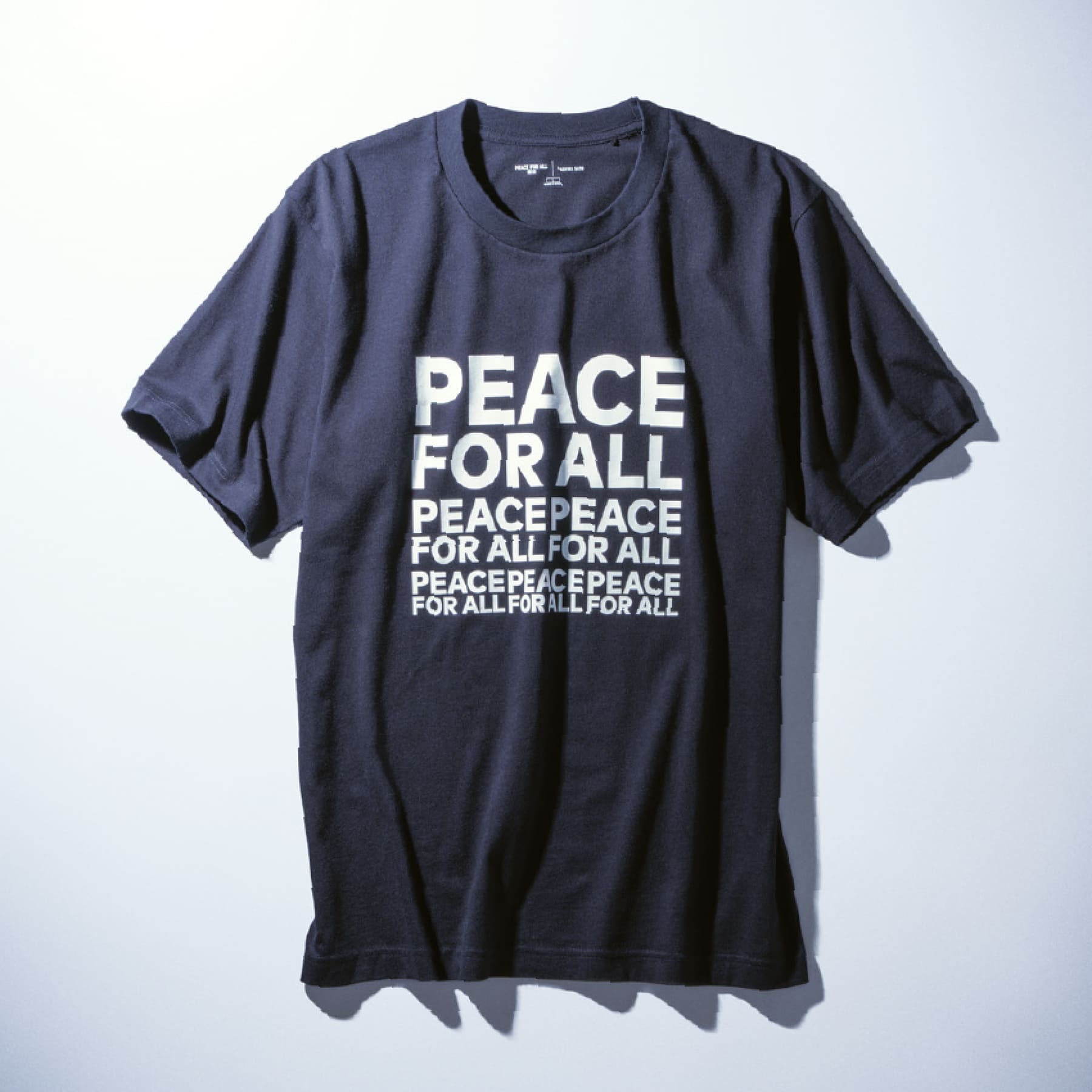PEACE FOR ALL PEACE FOR ALL
昨日よりも平和な今日を実現するために、私たちができること 「世界の平和を願ってアクションする」そんなユニクロの想いに賛同した著名人がボランティアで参加し、平和への願いを込めてデザインしたTシャツを続々と発表。その利益の全額は、貧困、差別、暴力、紛争、戦争によって被害を受けた人々を支援する、国際的な団体へと寄付されます。PEACE FOR ALLは、「あなた」がTシャツを着ることで動き出すプロジェクト。すべての人が安全に暮らせる未来と、世界の平和を願って。
ユニクロはこの取り組みを、世界中の人とともにひろげていきます。
Tシャツ販売による寄付金総額
(プロジェクト開始から2025年7月末時点)
Tシャツ販売による寄付金総額
(プロジェクト開始から2025年7月末時点)
2,479,861,200 円
世界での総販売枚数
世界での総販売枚数
8,266,204 枚
Tシャツを見る PEACE FOR ALL の平和に向けた様々なアクション 国連難民高等弁務官事務所 UNHCR 国連の難民支援機関として、紛争や迫害のために避難を余儀なくされた難民や国内避難民、無国籍者などを保護・支援するため、さまざまなパートナーと連携しながら国際的な活動を主導。シェルター、食料、水などの緊急援助物資の提供から、基本的人権の擁護、一人ひとりのより良い未来に向けた解決策の提示などを展開中。1954年、1981年にはノーベル平和賞を受賞。
インタビュー UNHCRエチオピア 第三国定住専門官
モーリーン・ムサニ・ガチリ
UNHCRケニア 准教育担当官
アリ・オマール・デュアル
「難民の方々に、安全と尊厳、そして成長の機会を」
オフィシャルサイトはこちら 支出報告 合計(2022年〜2025年まで)
合計(2022年〜2025年まで)
570,720,342 円
※4,004,493米ドルを2025年4月30日のUS$1=JPY 142.52のレートで換算
バングラディッシュ自立支援 53.7 % UNHCR活動全般 25 % 緊急人道支援全般 18.5 % その他(パキスタン洪水緊急人道支援、サイクロン・モカ緊急人道支援) 2.8 % 戦火を逃れた人々に安心できる居場所を提供するウクライナ人道支援 ウクライナでの全面戦争は、数多くの犠牲者やインフラの破壊だけでなく、大規模な難民危機を引き起こしました。2025年3月20日時点でウクライナからの難民は690万人を超え、その92%が欧州全域に分散しています。難民は欧州以外の多くの国にも逃れ、そこでも温かく迎えられました。避難を強いられたウクライナ人に対する保護や支援の必要性は依然として高く、国連難民高等弁務官事務所(以下UNHCR)はウクライナと近隣の受け入れ諸国の両方で任務を遂行しています。戦争が急速に激化しておよそ3年、ウクライナでは人口の35%に当たる1,270万人が人道支援を必要としています。現在、避難を強いられている人はウクライナ人口の29%を超えています。
ウクライナ国内におけるUNHCRの取り組み(2022-2024年) 緊急シェルターキット受益者
緊急シェルターキット受益者
410,000 人以上
避難を余儀なくされた多くの人々は支援を必要としていますが、すべてをUNHCRだけで提供することはできません。他の国連機関や国際NGOなどのパートナーとともに、難民の安全を確保すべく近隣諸国の政府をサポートし、「ウクライナ情勢地域難民対応計画(RRRP)」を主導する重要な役割を果たしてきました。2022年には、RRRPの下で142のパートナーが集結し、2024年には合計312のパートナーが連携して活動しました。こうしたパートナーシップを軸に、UNHCRはウクライナ国内における「保護」「シェルター・支援物資」「キャンプ調整・運営」の各領域で主導的な役割を果たしています。2022年2月以来、UNHCRのチームは状況が許す限り、ウクライナ西部地域だけでなく、支援が届きにくい東部や南部まで活動を拡大させてきました。UNHCRは現地のパートナーや国際的に活動するパートナーと協力し、住宅被害を受けた人に緊急補修用シェルターキットを届け、住宅を修繕し、戦争によるトラウマ症状に苦しむ人に法的支援や心理カウンセリングを提供。これらの取り組みに寄付金の一部が活用されています。
生活の再建を目指す
ミャンマー・バングラデシュでの
災害支援や自立支援 2025年2月28日時点で、約100万人のロヒンギャ難民がバングラデシュに避難しています。バングラデシュは、数十年にわたりミャンマーから避難してきた多くのロヒンギャ難民に安全な避難場所を提供してきました。一方で、難民や庇護希望者は法的な立場を得ることができず、保護上のリスクにさらされるケースも増えています。2023年5月14日、サイクロン・モカがミャンマーとバングラデシュの国境近くの沿岸地域を襲い、何百万人もの人々に壊滅的な影響を及ぼし、家屋やインフラを破壊しました。大雨による洪水は、ミャンマー国内で避難を余儀なくされた多くの人々や、バングラデシュに逃れたロヒンギャ難民に影響を及ぼしました。約4万人のロヒンギャ難民の避難所が損壊または損傷し、さらに多くの人々が、水、衛生、衛生設備(WASH)へのアクセスを失いました。ロヒンギャ難民の安全で自発的かつ尊厳のあるミャンマーへの帰還は、バングラデシュ政府と人道支援コミュニティの共通の目標であることに変わりありませんが、現在のミャンマーの政情、法律、社会、経済状況を考慮すると簡単ではありません。そのため、難民への支援を継続するとともに、難民のレジリエンスと自立を強化する機会を提供することが不可欠です。
バングラデシュでの自立支援プロジェクト(2025年2月まで) 縫製研修を受けた難民女性
縫製研修を受けた難民女性
773 人
布ナプキンの製作
布ナプキンの製作
7,662,141 枚
生産・訓練センターの改修・新設
生産・訓練センターの改修・新設
5 棟
バングラデシュに避難しているロヒンギャ難民は、自分たちの能力やスキルを発揮する場を求めています。例えば、国連や現地パートナー団体の支援を得て、保健、教育、建設、難民保護サービスなどに関するスキルを身につけ、ボランティアとしてサービスの提供に従事する難民もいます。2022年からユニクロは、コックスバザール難民キャンプ内における自立支援にも資金と技術の協力を行っています。このプロジェクトはキャンプ内の生産・訓練センターで実施され、参加した女性たちはキャンプ内で配布される布ナプキンや下着を製作する技術を身につけました。製品の生産により得た手当は彼女たちの生活の支えになっています。皆様からの寄付金の一部が、これらの取り組みに活用されています。なお2023年のサイクロン・モカに対する緊急支援では、ユニクロをはじめとするパートナーからの支援により、UNHCRはミャンマーの国内避難民向けに合計3万7,000枚のプラスチックターポリン、3万枚の蚊帳、1万8,000個のソーラーランプ、1万4,000枚の波形鋼板、4,000セットのキッチンセットを、ロヒンギャ難民4,512世帯にシェルターを提供し、45の教育施設を修繕することができました。
子どもや女性に安全を提供し、未来への希望を模索する南スーダン人道危機への支援 南スーダンの難民のうち、約65%は子どもです。2025年2月末時点で、隣国に受け入れられている220万人以上の難民は、極度の干ばつや地域の食糧不安状況などの影響を受け、不安定な状況に置かれています。紛争が始まってからほぼ10年が経過し、平和協定の実施に向けた努力が続けられているにも関わらず、南スーダンは断続的な暴力、慢性的な食糧不安、壊滅的な洪水と闘い続けており、これらは人道的な成果を損なう原因にもなっています。
ジェンダーによる暴力の予防と対応 UNHCRは、女性と子ども、つまり難民の大多数を占める人々のため、受け入れ国への支援を続けます。命を救う支援には、ジェンダーに起因する暴力の予防と対応に貢献することが含まれます。法的および物理的な保護が強化され、ホスト国の政府と協力して生体認証登録、文書化、データ管理を強化しています。UNHCRは、難民とホストコミュニティ間の社会的な結束を促進し、包括的で持続可能な解決策の達成を目指しています。これらの取り組みに、寄付金の一部が活用されています。ユニクロは難民自立支援プログラムの一環として、UNHCRが立ち上げたハンドメイドブランド「MADE51」の活動に賛同し、2021年からブランドの認知向上と難民の自立を支援しています。2023年の世界難民の日(6月20日)には、南スーダンの難民の女性をはじめとした職人の方々が故郷で培った技術や才能を発揮し、ユニクロとのコラボグッズとしてオリジナルキーチェーンやブレスレットを制作しました。
セーブ・ザ・チルドレン
SAVE THE CHILDREN 1919年に英国にて創設。子どもの権利のパイオニアとして、すべての子どもにとって、生きる・育つ・守られる・参加する権利が実現された世界を目指し、現在、世界約110カ国で子ども支援活動を展開する国際 NGOです。日本では1986年にセーブ・ザ・チルドレン・ジャパンが設立されました。
インタビュー セーブ・ザ・チルドレン・インターナショナル
事務局長 インゲル・アッシン
「すべての子どもが、可能性を発揮できる未来を目指して」
オフィシャルサイトはこちら 支出報告 合計(2022年6月~2025年2月)
合計(2022年6月~2025年2月)
530,323,484 円
海外緊急・人道支援
合計
合計
239,458,300 円
子どものための緊急人道支援基金
(Children’s Emergency Fund) 74 % その他緊急支援 26 % 子ども・青少年のエンパワーメント
合計
合計
290,865,184 円
マダガスカルでの青少年の貧困、保健・栄養改善支援 44 % バングラデシュにおける青少年の起業・就業支援 35 % カンボジアの子どもたちに対する暴力撤廃促進 21 % 今に、未来に、絶望しない世界を。
紛争や自然災害から子どもたちを守る 世界では4億7,300万人、じつに6人に1人の子どもたちが紛争下での暮らしを余儀なくされています。また、世界的な食料危機により、1億5,000万人以上の子どもが命の危機にさらされています。世界中を見渡せば、紛争や感染症、災害、食料危機などの人道危機に、3億人近くもの人々が直面している現実があります。あらゆる問題が複雑化、長期化する中で、大地震をはじめとする自然災害や、紛争の影響を受けた子どもたちとその家族に対しては、迅速かつ柔軟な緊急初動対応が求められます。PEACE FOR ALLによる寄付金の一部もこれらの緊急人道支援に生かされています。
子どものための緊急人道支援基金
(Children’s Emergency Fund)(2022年6月~) 世界71の国・地域
1,200万人の子どもを含む
支援受益者
世界71の国・地域
1,200万人の子どもを含む
支援受益者
24,000,000 人
セーブ・ザ・チルドレンでは、世界各地で発生するあらゆる人道危機に対して速やかな支援ができるよう、一定の資金を準備する子どものための緊急人道支援基金(Children’s Emergency Fund)を設置しています。この仕組みを活用し、2024年は世界71の国・地域で、1,200万人の子どもを含む、2,400万人に支援を届けました。
ウクライナ国内での支援(2022年6月~) 3年間での支援受益者
子ども
3年間での支援受益者
子ども
1,500,000 人
2022年2月24日以降、ウクライナ国内で、現金給付による支援や、こころのケア、水・食料・衛生用品などの基本的ニーズに対する支援、教育支援など、150万人の子どもたちを含む、約380万人に支援を提供しました。また、国内28カ所に「こどもひろば」ネットワークを構築。地域のパートナー団体と協力して、26万人以上の子どもたちの精神的・心理的な健康(ウェルビーイング)を継続的に支援しています。
ミャンマー大地震での支援(2025年3月~) 2025年3月28日、ミャンマーを震源地として発生した大地震の発生直後から緊急支援を開始。2025年4月23日現在、最も影響を受けた地域の子ども25,000人以上を含む、84,000人以上への支援活動を行いました。これまで22,000人以上に食料を、58,000人以上に飲料水を届けたほか、被災した方々が食品、医薬品や、必要物資を購入できるよう、15,000人以上に現金の給付を実施しました。
貧困や暴力の連鎖を断ち切るために。子ども・青少年のエンパワーメント アジアやアフリカ諸国では、貧困状態に陥ったり、暴力の危険に晒されたり、差別によって、多数の子どもや青少年が自らの人生を生きる機会を奪われています。多くの場合、彼らが暮らすコミュニティでは家庭や地域からの暴力的なしつけが横行し、児童婚・児童労働の常態化、暴力や搾取、差別や虐待が後を絶ちません。また、こうした問題を予防し、子どもを保護する体制や行政支援も整っていません。セーブ・ザ・チルドレンは、子どもや青少年たちの自立を支援し、暴力や差別、貧困の連鎖を断ち切る主体となるような地域社会の実現に取り組んでいます。PEACE FOR ALLによる寄付金の一部もこの取り組みに生かされています。
バングラデシュにおける青少年の起業・就業支援(2023年9月~) 研修後に
就業機会を獲得した
青少年の割合
研修後に
就業機会を獲得した
青少年の割合
82.2 %
脆弱な状況にある青少年が、自らの力で貧困の連鎖を断ち切ることができるよう、バングラデシュ・チッタゴン市のスラムに暮らす女性をはじめとする延べ157人の青少年に対し、必要な知識やスキル、マインドセットを身につける研修を行いました。研修などを通じ就業・起業支援、啓発活動、政府・民間機関との連携強化などに取り組んでいます。
マダガスカルでの青少年の貧困、保健・栄養改善支援(2024年7月~) 研修に参加した青少年の人数
研修に参加した青少年の人数
1,022 人
マダガスカルのヴァトヴァヴィ地域に暮らす青少年が、自身とその子どもたちの生活環境を見直し、保健・栄養状態を改善できるよう、生計向上のための貯蓄や融資に関する研修、自己決定できるような能力強化、子どもの栄養改善支援およびリプロダクティブヘルスに関する啓発活動に取り組んでいます。こうした研修に参加した青少年のうち、77%に生計スキルの向上が見られました。
カンボジアの子どもたちに対する暴力撤廃促進(2024年7月~) 支援を受けている
子ども
支援を受けている
子ども
12,600 人
カンボジアのコンポンチャム州カンメア郡にある43の公立小学校において、子どもたちが暴力の影響なく安心・安全な日々を学校ですごせるよう、子どもたちへの啓発活動、関係者の能力強化、地域連携強化などに取り組んでいます。
プラン・インターナショナル
PLAN INTERNATIONAL 誰もが平等な世界の実現を目指し、世界80カ国以上で活動する国際NGO。創立は1937年。子どもや若者、地域の人々とともに地域開発を進め、特に貧困や暴力、差別や排除によって弱い立場に置かれている女の子や女性への支援に力を入れている。子どもたちが生まれてから大人になるまで寄り添い、自らの力で困難や逆境を乗り越えることができるよう支援している。
インタビュー プラン・インターナショナルが支援した全寮制学校に通うミングさん(15才)
「児童婚の悪習を撲滅するために、私たちができること」
オフィシャルサイトはこちら 支出報告 合計(2023年4月~2025年3月)
合計(2023年4月~2025年3月)
122,072,397 円
※4,004,493米ドルを2025年4月30日のUS$1=JPY 142.52のレートで換算
ベトナム児童婚プロジェクト 43 % アジア災害・緊急人道支援ファンド 43 % インド職業訓練プロジェクト 10 % スーダン人道危機プロジェクト 4 % 自分の人生を「選べる」未来のために
ベトナムにおける児童婚防止プロジェクト ベトナム最北端のハザン省には少数民族が多く暮らしており、山間部は貧困率が高く、厳しい生活を強いられています。特に現地の社会課題として、幼い年齢で結婚を強いられる児童婚などの有害な慣習があり、早すぎる結婚(児童婚)をした女の子は、学校を中途退学することが多く、将来収入を得る機会を失うことにもつながるため、学生や教師、親を対象にトレーニングや意識啓発活動、学校施設の整備を実施しています。早すぎる結婚の弊害に関する理解を深め、女の子が自らの意思で人生の選択ができるようになることを目的としています。また、2024年9月に発生した台風・洪水の復興支援の一環として、破損した学校施設の整備も行っています。
教師の研修(2023年4月~2024年12月) トレーナー養成研修を
受けた教師
トレーナー養成研修を
受けた教師
613 人
トレーナーが延べ613人(うち女性372人)の教師等に研修を行い、その後、各校で包括的性教育の授業が行われました。スクールカウンセラーの役割を務める教師延べ137人(うち85人が女性)に性と生殖に関する健康と権利(SRHR)をテーマにしたカウンセリングスキルの研修を行いました。
子どもたちへの啓発(2023年4月~2024年12月) 啓発イベント参加者
啓発イベント参加者
13,766 人
性と生殖に関する健康と権利、児童婚についての意識啓発を行うイベントを開催。イベントは地元の学校の啓発グループメンバーが中心となって実施されました。生徒、教師、保護者など延べ13,766人が参加し、寸劇や映画鑑賞、ゲームなどのアクティビティを通して児童婚とSRHRについて学ぶ機会を創出しました。
学校施設の建設・修繕と備品の提供(2023年4月~2024年12月) 学生寮の建設と修繕、トイレの建設、啓発教材や備品を支給しました。
スラム街で生きる若者に、貧困から抜け出す「チカラ」を。ユニクロ・インドと連携した就労支援プロジェクト インドの若者の約3人に1人が無就学、無就労、職業訓練を受けていないニートであり、特に女性のニートの割合は男性の約5倍にのぼり、労働参加における大きなジェンダーギャップがあります。デリーのスラム街に移住した家庭の多くは非正規雇用やインフォーマルセクターで働く貧困層で、若者たちは職業訓練を受け、生計を立てる手段が非常に限られています。デリーのスラム街に住む18~29歳の若者2,700人、特に女性が、持続的な雇用または自営業につながるスキルと能力を身に付けることを目的として、ユニクロ・インドと連携して小売、縫製、看護・介護アシスタントの3コースの職業訓練と就労支援を行っています。
職業訓練コースの実施(2025年1月~3月) コミュニティで職業訓練に関する啓発活動と研修生の募集を行い、小売、縫製、看護・介護アシスタントの3コースに計62人(うち女性37人)の若者が参加しました。
戦火を逃れた人々に、安心と安全を提供する。スーダン人道危機プロジェクト 2023年4月に紛争が発生してから2年が経過しました。2025年3月時点で、スーダンの国内避難民(IDP)は約1,130万人と世界で最も多く、また支援を必要とする人は3,040万人に上ります。スーダン各地には自然発生的に作られた小規模の避難所が点在しており、これら避難所の多くは、給水施設などの基本的なインフラがほとんど整備されていません。避難所は地域住民からの差し入れやスーダン人同士の助け合いによって維持・運営されていますが、支援が十分に届いていない場所も多くあります。差し入れ食料に頼っている人も多く、避難者は食事の回数を1日1回に減らすなどして困難な状況を乗り越えています。栄養や衛生状況は芳しくなく、急性下痢症の発生も報告されています。避難所の状況は非常に厳しく、支援の強化が急務です。特に給水施設の整備や食料支援の充実が必要です。
これまでの主な支援事業一覧 食料バスケットの配布(2025年4月15日~5月30日)
国内避難民のニーズ調査を実施し、食料バスケット2000セットを調達しました。紅海州の避難所に居住する脆弱な世帯を特定し、804世帯(約4,020人)へ食料バスケットを配布することができました。
給水車による給水活動(2025年4月15日~5月31日)
給水施設が整備されていない紅海州に位置する避難民キャンプ1か所へ給水車を出動させ、避難民が安全な水へアクセスできるようになりました。
子どもひろばの設置(2025年4月15日~5月31日)
基本的なインフラが整備されていないガダーレフ州の避難民キャンプ1か所において、避難の途上において暴力を目にした子ども、保護者を失った子どもの保護と心のケアのため、子どもたちが遊びなどの活動を通じてストレスを軽減し、一日も早く日常を取り戻せるように「子どもひろば」を設置しました。
アジアで多発する自然災害。迅速な支援を実現する災害・緊急人道支援ファンド 相次ぐ台風や洪水、高潮、地震、そして津波。アジアは自然災害が多発する地域であり、温暖化が世界平均を上回るペースで進行しています。国際機関※1によると、1991年から2022年の温暖化傾向は、1961年から1990年の期間と比較してほぼ2倍の数値で推移しています。毎年多くの人々が、災害によって家や生活基盤を失っており、アジアの大部分では、今後数十年間で異常気象の頻度と深刻度がさらに増すと予想されています。「気候変動の最前線※2」とも呼ばれるアジアにおいて、災害発生後に迅速な人道支援活動を行うための緊急支援ファンドを設立。十分な食料や安全な水、医療サービスを得られぬまま、過酷な環境に耐えている被災者に対し、救援物資の支給、医療用品の提供、簡易保健所を設置するなど多角的な支援を展開。屋外での生活を強いられている多数の避難者のため、シェルター・トイレ・給水所を設置するなど衛生環境の整備も行なっています。また、災害時に増加する子どもの人身取引や性的虐待などのリスクへの対応、保護、心理社会的ケアの提供に加えて、学用品の支給を含む学校再開支援や、生活再開支援にも取り組んでいます。PEACE FOR ALLによる寄付金の一部もこれらの取り組みに生かされています。
これまでの主な支援事業一覧 ベトナム:台風ヤギ 生活再開支援 (報告対象期間:2025年2月~3月)
これまでに被災100世帯(553人、うち子ども193人、女性176人、障害を持つ子どもと大人8人)を対象にとうもろこしの種と肥料を支給しました。全世帯に対して、子どもの保護や災害への備えの啓発も併せて行いました。
フィリピン:台風チャーミー・マンイー 生活再開支援 (報告対象期間:2025年2月~3月 支援継続中)
これまでに被災660世帯(3,451人、うち子ども1,283人、女性972人、障害を持つ子どもと大人170人)を対象とする多目的現金給付を完了しました。給付にあたって、全660世帯がPSEAH(性的搾取・虐待・ハラスメントからの保護、GBV(ジェンダーに基づく暴力)、子どものセーフガーディングについて研修を受講しました。
ミャンマー:ミャンマー大地震 救援物資支給、トイレ・給水所の設置など (報告対象期間:2025年3月 支援継続中)
大地震発生直後から緊急支援を開始し、これまでに合計11,448世帯(20,541人、うち女性51%)に対して、緊急支援物資(食料、飲料水、毛布、ビニールシート、LEDライトなど)やトイレ・給水設備の支援、生理用品を含む衛生キットと安産キットの提供、子どもに優しい空間の設置支援を行いました。

